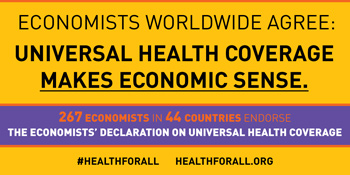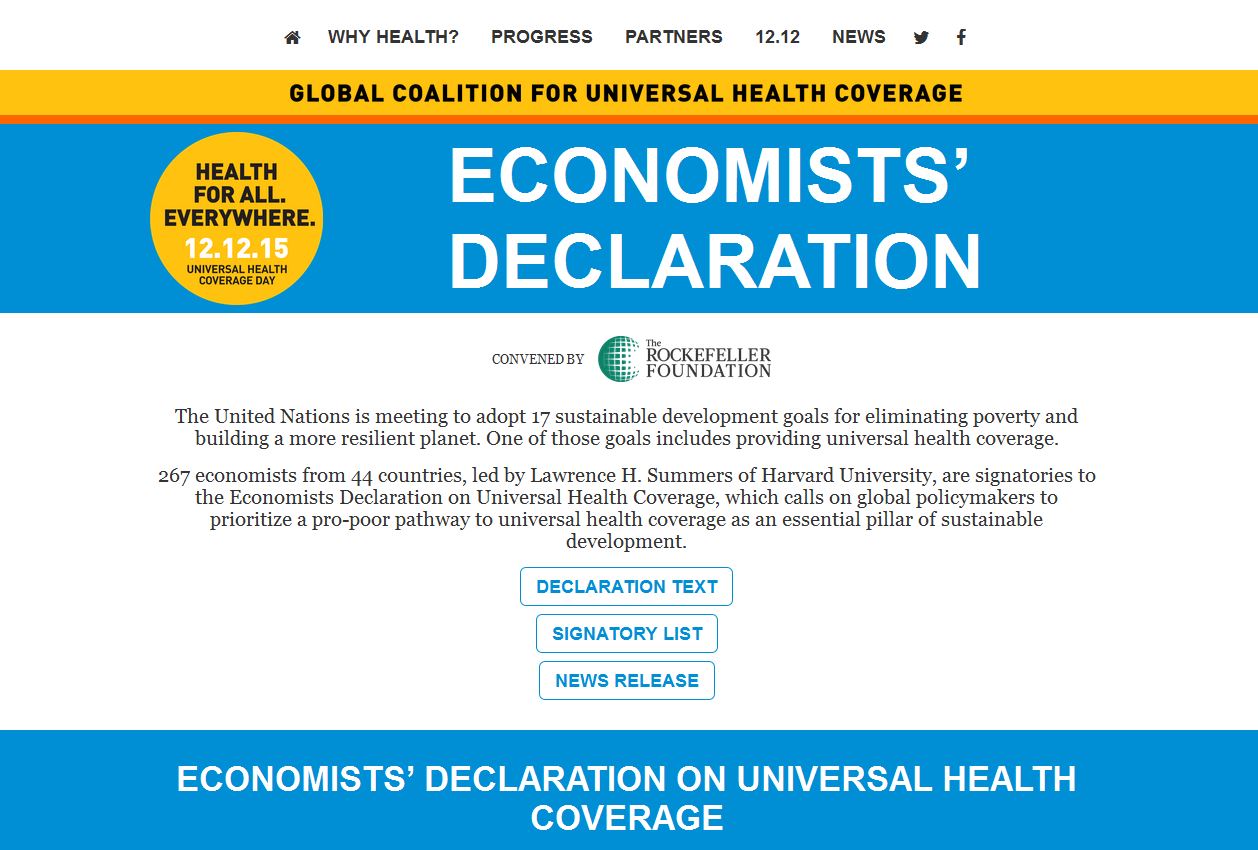Prof. Markandya endorsed the Economists’ Declaration on Universal Health Coverage
Prof. Anil Markandya , Scientific Director of BC3, Basque Centre for Climate Change, is among the 267 experts in 44 countries who have made a declaration at the Lancet that universal health coverage is a smart, affordable investment to save millions of lives, protect livelihoods and strengthen economies.

Universal health coverage means ensuring that everyone can obtain essential health services at high quality without suffering financial hardship.
Published in the Lancet , scientific journal (http://www.thelancet.com/pdfs/journals/lancet/PIIS0140-6736%2815%2900242-1.pdf ) ahead of the United Nations Sustainable Development Summit 2015 https://sustainabledevelopment.un.org/post2015/summit the experts say this is a crucial moment for global leaders to reflect on financial investments to maximise progress by 2030.
The declaration was made by economists on every continent, five Nobel Laureates, current and former Chief Economists of the World Bank and leading experts in health and development economics.The signatories urged that;
- Heads of government increase domestic funds for global health
convergence and provide vocal political leadership to implement policy
reforms toward pro-poor universal health coverage;
- Donor countries meet their pledges for international development assistance and commit to investing in the global functions of development assistance for health, particularly research and development for diseases of poverty;
- Development financing discussions explicitly address equity, including who pays domestically and who benefits;
- National policymakers embrace universal health coverage, as defined above, as an integrated approach for measuring progress toward health targets in the post-2015 global development framework.

http://universalhealthcoverageday.org/economists-declaration/
With the United Nations set to launch the bold sustainable development agenda (25-27 Sept) , this is a crucial moment for global leaders to reflect on the financial investments needed to maximize progress by 2030. As an input into deliberations around those investments, the signatories to this declaration, 267 economists from 44 countries, call on global policymakers to prioritize a pro-poor pathway to universal health coverage as an essential pillar of development.
Universal health coverage means ensuring that everyone can obtain essential health services at high quality without suffering financial hardship. Resource constraints require individual countries to determine their own definition of “essential” – while recognizing, in the words of former World Health Organization Director-General Gro Harlem Brundtland, that “... if services are to be provided for all, not all services can be provided. The most cost-effective services should be provided first.”
Even granted this recognition of resource constraints, our generation has a historic opportunity to achieve a “grand convergence” in global health, reducing preventable maternal, child, and infectious disease deaths to universally low levels by 2035. In its report, Global Health 2035, the Lancet Commission on Investing in Health showed that with today’s powerful tools for improving health, and the prospect for continued improvement in those tools, financially feasible universal health coverage in every country could lead to grand convergence with its accompanying benefits in both health and in protection from health-related financial risks. (1)
We amplify these points below.
Our global society has a vested interest in investing in health to transform lives and livelihoods.
• Health is essential to eradicating extreme poverty and promoting growth of well-being. (2,3) Over the past decade, health improvements – measured by the value of life-years gained – constituted 24% of full income growth in low- and middle-income countries. (1)
• Health systems oriented toward universal health coverage, immensely valuable in their own right, produce an array of benefits: in times of crisis, they mitigate the impact of shocks on communities; in times of calm, they foster more cohesive societies and productive economies.
• The economic benefits of investment in grand convergence are estimated to be more than 10 times greater than costs – meaning that early stages on the pathway to universal health coverage, focused on high-payoff convergence interventions, will have high value relative to the cost of raising revenue, including the deadweight (or welfare) cost of taxation, or (in most cases) to the value of its use in other sectors. (4)
The success of the next development chapter hinges on the ability to actually deliver proven health solutions to the poorest and most marginalized populations.
• There is a strong record of public sector and development assistance success in the finance and delivery of transformative health interventions – immunizations, treatment of HIV/AIDS, tuberculosis and childhood infections, and eradication or near eradication of major communicable diseases. At the same time most countries have experienced difficulties with delivering primary and secondary care in both the public and private sectors. Continued progress toward universal health coverage will require addressing these delivery problems.
• 150 million people fall into poverty every year paying for health out-of-pocket. (5) By pooling funding and providing early access to health services, universal health coverage reduces reliance on out-of-pocket payments, thereby protecting households from impoverishing financial risks.
• The Ebola virus disease epidemic has reminded us that we are only as strong as our weakest links. The debilitating effect of Ebola could have been mitigated by building up public health systems in Guinea, Liberia and Sierra Leone at one third the cost of the Ebola response so far. (6)
Every country has the opportunity to achieve universal health coverage.
• More than 100 countries across the development spectrum have begun working toward universal health coverage – testing and increasingly demonstrating its feasibility.
• Countries will find greatest value for money by financing for everyone convergence-related services that are high-quality and free or low cost at the point of delivery. As their domestic resources increase, countries would expand the package of essential services that are publicly financed for all.
• Most countries have the capacity to raise more domestic funds for health through improved tax systems and innovative financing mechanisms. And given anticipated economic growth across low- and lower-middle-income counties, most countries will have additional financial means to invest more in health services and delivery. When allocated efficiently, greater investments in health can result in lower overall costs to the system. (1)
Development assistance for health will play an essential part in achievement of a grand convergence in global health and universal health coverage.
• Domestic funding alone will not be enough for many low-income countries to provide even the convergence-related health services. Focusing the available country-specific health aid on the convergence interventions in low-income (but committed) countries can provide invaluable help.
• A grand convergence in global health will be greatly helped by substantial investments from donors in the neglected global functions of development assistance for health: providing global public goods such as health research and development, dealing with cross-border externalities such as pandemics and antimicrobial resistance, and supporting leadership and stewardship of global institutions. Adequate finance of these global functions is likely to prove the most efficient path to improving conditions of the poor in middle-income countries. (7)
We, the undersigned, therefore urge that:
• Heads of government increase domestic funds for global health convergence and provide vocal political leadership to implement policy reforms toward pro-poor universal health coverage;
• Donor countries meet their pledges for international development assistance and commit to investing in the global functions of development assistance for health, particularly research and development for diseases of poverty;
• Development financing discussions explicitly address equity, including who pays domestically and who benefits;
• National policymakers embrace universal health coverage, as defined above, as an integrated approach for measuring progress toward health targets in the post-2015 global development framework.
• • •
Even with substantial rates of economic growth, resources for health (and other sectors) will remain highly constrained. The intrinsic value of improved health – and the demonstrated potential of governments and aid agencies to deliver key health interventions – points to maintaining and expanding commitment to health through investing in pro-poor pathways to universal health coverage. Amartya Sen has labeled this opportunity “the affordable dream.”
Publication:
• Lawrence H Summers et al. Economists' Declaration on Universal Health Coverage. The Lancet. DOI: 10.1016/S0140-6736(15)00242-1
